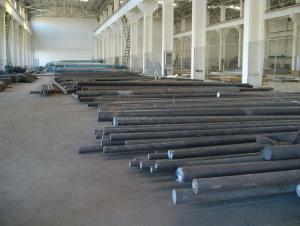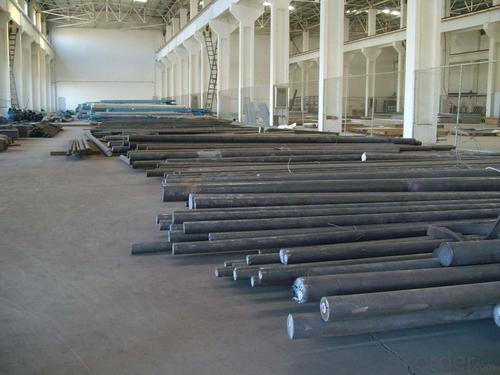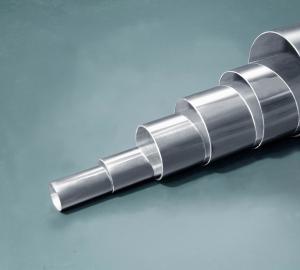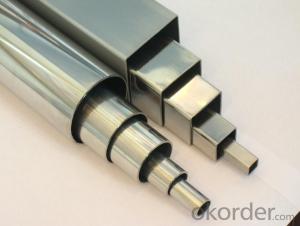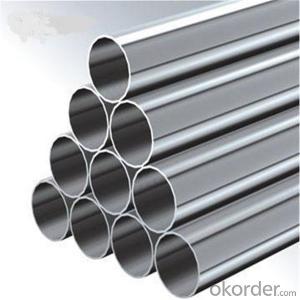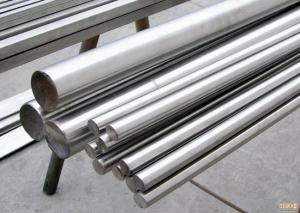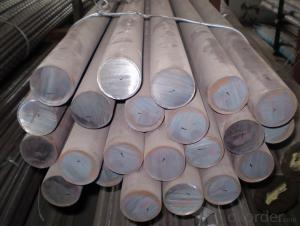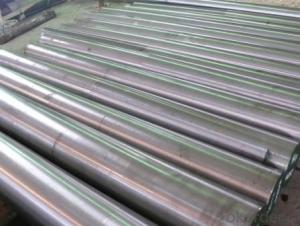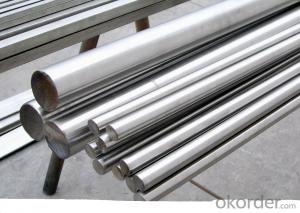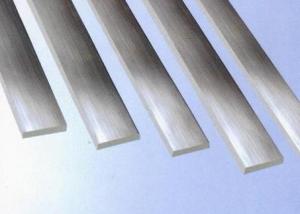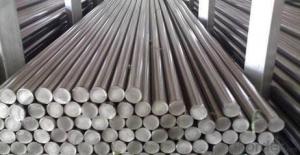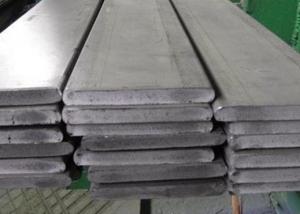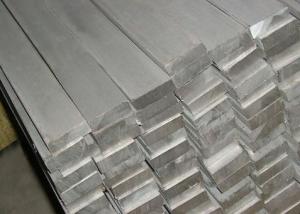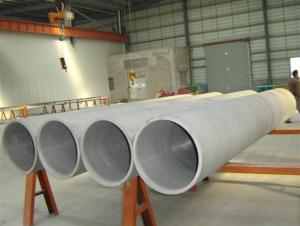316L Black/Acid/Bright/Grinded stainless steel bars
- Loading Port:
- Tianjin
- Payment Terms:
- TT OR LC
- Min Order Qty:
- 100 kg
- Supply Capability:
- 1000 kg/month
OKorder Service Pledge
Quality Product, Order Online Tracking, Timely Delivery
OKorder Financial Service
Credit Rating, Credit Services, Credit Purchasing
You Might Also Like
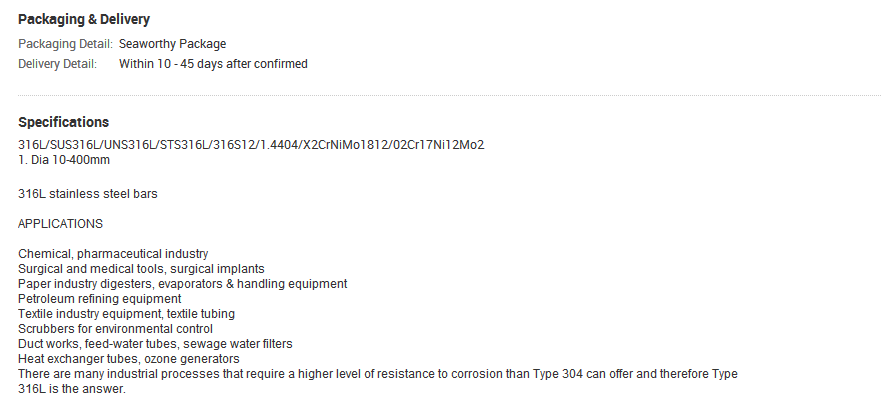
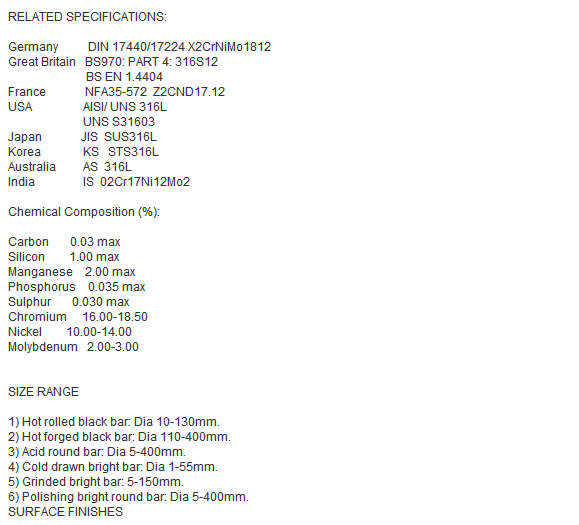
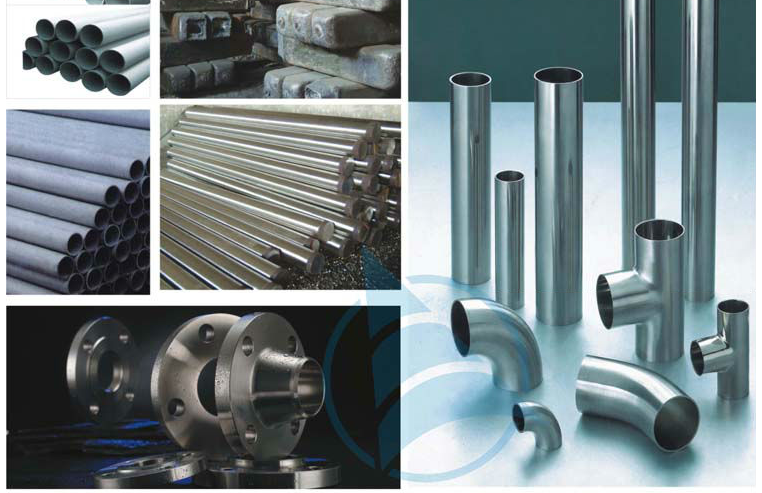
- Q: Can stainless steel pipes be used for underground sewer lines?
- Yes, stainless steel pipes can be used for underground sewer lines. Stainless steel is a highly durable and corrosion-resistant material, making it an ideal choice for applications in harsh environments such as underground sewer systems. It offers excellent resistance to chemicals, moisture, and other corrosive substances commonly found in sewer lines. Additionally, stainless steel pipes have a long lifespan and require minimal maintenance, making them a cost-effective option in the long run. However, it is important to consider the specific requirements and regulations of the local sewer system before selecting stainless steel pipes for underground applications.
- Q: What is the cost of stainless steel pipes compared to other materials?
- The cost of stainless steel pipes compared to other materials can vary depending on various factors such as the type of stainless steel used, the size and thickness of the pipes, and the current market conditions. In general, stainless steel pipes tend to be more expensive than pipes made from other materials like carbon steel or PVC. Stainless steel is known for its high corrosion resistance, durability, and strength, making it a preferred choice in industries where these properties are essential, such as oil and gas, chemical processing, and food processing. However, the higher cost of stainless steel pipes can be justified by their long-term benefits and lower maintenance requirements. Additionally, stainless steel pipes offer advantages over other materials in terms of hygiene and cleanliness, as they are easy to clean, non-porous, and resistant to bacteria growth. This makes stainless steel pipes suitable for applications in the pharmaceutical, medical, and food industries. It is important to consider the specific requirements of the project or application when comparing the cost of stainless steel pipes to other materials. While stainless steel pipes may have a higher upfront cost, their superior performance, longevity, and resistance to corrosion can often result in cost savings over the long term.
- Q: What is the difference between 304 and 304L stainless steel pipes?
- The main difference between 304 and 304L stainless steel pipes lies in their carbon content. 304 stainless steel pipes contain a maximum of 0.08% carbon, while 304L stainless steel pipes have a maximum of 0.03% carbon. This lower carbon content in 304L pipes helps to minimize the risk of carbide precipitation during welding, which can lead to intergranular corrosion. Due to the lower carbon content, 304L stainless steel pipes are more resistant to sensitization, a phenomenon where chromium carbides form at grain boundaries, reducing the corrosion resistance of the material. This makes 304L pipes suitable for applications where they may be exposed to high temperatures and corrosive environments, such as in the food processing industry or in chemical plants. In terms of mechanical properties, both 304 and 304L stainless steel pipes have similar strengths and hardness. However, the lower carbon content in 304L pipes can lead to slightly higher tensile and yield strength compared to 304 pipes. Additionally, 304L pipes have improved welding and forming characteristics, making them easier to work with during fabrication. In summary, the main difference between 304 and 304L stainless steel pipes is their carbon content. 304L pipes have a lower carbon content, which reduces the risk of sensitization and carbide precipitation during welding. This makes 304L pipes more suitable for applications where they may be exposed to high temperatures and corrosive environments.
- Q: What are the common standards for stainless steel pipes?
- The common standards for stainless steel pipes vary depending on the specific application and industry. However, there are several widely recognized standards that are commonly used in the manufacturing and specification of stainless steel pipes. One of the most widely used standards is ASTM International, which sets the standards for various materials, including stainless steel. ASTM A312/A312M is the standard specification for seamless, welded, and heavily cold worked austenitic stainless steel pipes. This standard covers a wide range of pipe sizes and grades, including TP304, TP316, TP321, and more. Another commonly referenced standard is the American National Standards Institute (ANSI) standards. ANSI B36.19 specifies the dimensions, tolerances, and materials for stainless steel pipes. This standard covers both seamless and welded stainless steel pipes and includes a range of sizes and schedules. In addition to these standards, there are also specific standards for certain industries. For example, the American Petroleum Institute (API) has standards such as API 5L for line pipes used in the oil and gas industry. These standards outline the requirements for materials, dimensions, and testing for stainless steel pipes used in specific applications. Other standards organizations, such as the International Organization for Standardization (ISO) and the European Committee for Standardization (EN), also provide standards for stainless steel pipes. ISO 1127, for example, specifies the dimensions and tolerances for stainless steel pipes used in general purposes. It is important to note that these standards are continuously updated and revised based on technological advancements and industry needs. Therefore, it is crucial to consult the latest versions of these standards to ensure compliance and quality in the manufacturing and use of stainless steel pipes.
- Q: How do stainless steel pipes compare to other materials like carbon steel or PVC?
- Stainless steel pipes have several advantages over other materials like carbon steel or PVC when it comes to various applications. Firstly, stainless steel pipes are renowned for their excellent corrosion resistance. They are resistant to rust, oxidation, and staining, making them suitable for use in environments with high moisture or chemical exposure. In contrast, carbon steel pipes are susceptible to corrosion and require protective coatings to prevent rusting, while PVC pipes are not resistant to certain chemicals and can degrade over time. Secondly, stainless steel pipes offer exceptional strength and durability. They can withstand high pressure and extreme temperatures, making them ideal for applications that require robust and long-lasting piping systems. Carbon steel pipes also possess good strength characteristics, but they may not be as resistant to corrosion as stainless steel. On the other hand, PVC pipes are relatively weaker and may not be suitable for high-pressure applications. Furthermore, stainless steel pipes have excellent hygienic properties. They are non-porous, smooth, and easy to clean, making them suitable for use in industries such as food and beverage, pharmaceuticals, and healthcare, where maintaining cleanliness and preventing bacterial growth is crucial. Carbon steel pipes, due to their porous nature, can accumulate contaminants and bacteria over time. PVC pipes, although easy to clean, may release certain chemicals into the water or fluids passing through them, which can be a concern in certain applications. Lastly, stainless steel pipes are highly versatile. They can be used in a wide range of applications, including water supply, gas pipelines, chemical processing, oil and gas exploration, and architectural purposes. Carbon steel pipes are also versatile but may require additional measures to prevent corrosion. PVC pipes, while suitable for certain applications, have limitations in terms of temperature and pressure ratings. Overall, stainless steel pipes offer superior corrosion resistance, strength, durability, and hygienic properties compared to carbon steel or PVC pipes. When choosing a piping material, it is essential to consider the specific requirements of the application to ensure optimal performance and longevity.
- Q: What is the difference between seamless and seamless annealed stainless steel pipes?
- The manufacturing process and resulting properties of seamless and seamless annealed stainless steel pipes are the main points of differentiation between them. Seamless stainless steel pipes are created by piercing a hot billet or solid bar, forming a seamless hollow cylindrical shape. This manufacturing method eliminates the need for welding or any other joints, resulting in a continuous and uniform pipe without any seams. Seamless pipes are highly regarded for their exceptional strength and ability to withstand high pressures, making them a suitable choice for various industries such as oil and gas, petrochemical, and construction. On the contrary, seamless annealed stainless steel pipes undergo an additional heat treatment process known as annealing. Annealing involves heating the pipe to a specific temperature, maintaining it at that temperature for a certain duration, and then gradually cooling it. This heat treatment helps relieve internal stresses, decrease hardness, enhance ductility, and improve the overall mechanical properties of the stainless steel pipe. Moreover, the annealing process fosters the development of a more homogeneous microstructure, further improving the corrosion resistance of the stainless steel. This characteristic makes seamless annealed stainless steel pipes particularly appropriate for industries that require excellent resistance to corrosion, such as chemical processing, pharmaceuticals, and the food and beverage sectors. To sum up, although both seamless and seamless annealed stainless steel pipes are produced without any seams, the latter's additional annealing process enhances its mechanical properties and corrosion resistance, making it more suitable for specific industries and applications.
- Q: What is the chemical composition of stainless steel pipes?
- Stainless steel pipes consist mainly of iron, chromium, and other elements in varying quantities based on the specific grade or type. Iron is the primary element responsible for providing the pipes with their structural strength and durability. Chromium, on the other hand, plays a crucial role in conferring corrosion-resistant properties to stainless steel. It creates a thin, protective layer on the steel's surface that shields it from oxidation and rust. Additionally, stainless steel pipes often contain other elements such as nickel, molybdenum, and manganese. These elements further enhance the pipes' resistance to corrosion, bolster their strength, and bestow them with specific properties. The precise chemical composition of stainless steel pipes can differ significantly depending on the intended application and grade, enabling varying levels of strength, corrosion resistance, and heat resistance.
- Q: What is the difference between 440C and 440F stainless steel pipes?
- The main difference between 440C and 440F stainless steel pipes lies in their carbon content. 440C stainless steel has a higher carbon content, making it harder and more resistant to wear and corrosion. On the other hand, 440F stainless steel has a lower carbon content, which enhances its machinability and makes it easier to form into various shapes.
- Q: What are the dimensions and sizes of stainless steel pipes?
- Different industrial and commercial applications are served by stainless steel pipes of varying dimensions and sizes. The sizing of these pipes is determined by their nominal diameter (DN) and the schedule or wall thickness. The nominal diameter represents the approximate internal diameter of the pipe and is commonly expressed in inches or millimeters. The most frequently available stainless steel pipe sizes range from 1/8 inch (3.175 mm) to 48 inches (1219 mm) in nominal diameter. However, larger sizes can be custom-made to meet specific requirements. The schedule or wall thickness of stainless steel pipes is indicated by a schedule number, which reflects the thickness of the pipe's walls. The most commonly used schedules for stainless steel pipes include Sch 5, Sch 10, Sch 40, and Sch 80. The higher the schedule number, the thicker the walls of the pipe. Apart from the dimensions and sizes, stainless steel pipes also come in various lengths, typically ranging from 20 feet (6.1 meters) to 40 feet (12.2 meters). Custom lengths can also be ordered based on specific project needs. It is important to note that these dimensions and sizes may differ based on the standards and specifications established by different countries and industries. Hence, it is crucial to consult the relevant standards or collaborate with a reliable supplier to ensure the precise dimensions and sizes of stainless steel pipes for a particular application.
- Q: Are stainless steel tubes and galvanized steel tubes the same?
- Stainless steel management theory, the whole is not rusty, from the table to the material is stainless steel, no surface and internal.
Send your message to us
316L Black/Acid/Bright/Grinded stainless steel bars
- Loading Port:
- Tianjin
- Payment Terms:
- TT OR LC
- Min Order Qty:
- 100 kg
- Supply Capability:
- 1000 kg/month
OKorder Service Pledge
Quality Product, Order Online Tracking, Timely Delivery
OKorder Financial Service
Credit Rating, Credit Services, Credit Purchasing
Similar products
Hot products
Hot Searches
Related keywords
